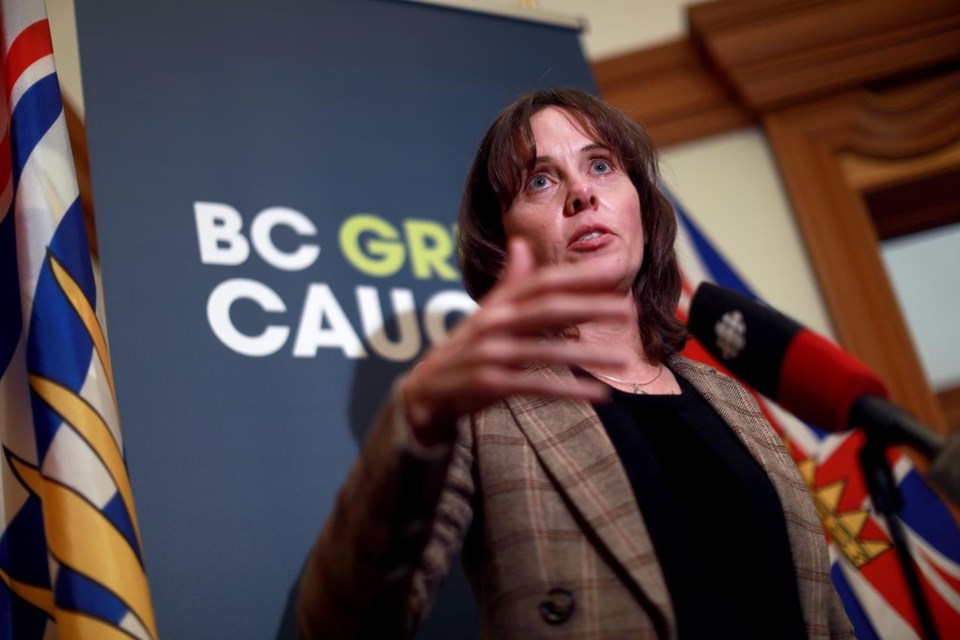VICTORIA — The approaching 2024 election in British Columbia is an opportunity for the Green Party to put forward issues that raise the bar for the province without worrying about wins and losses, Green Leader Sonia Furstenau says.
"I'm looking forward to 2024 and I'm looking forward to the opportunity for all the parties to put their visions out to British Columbians," said Furstenau, 53, in a year-end interview.
The B.C. Greens have two seats in the legislature after receiving 15 per cent of the popular vote in 2020.
Furstenau, who represents Cowichan Valley on Vancouver Island, said the campaign for the October election will see the Greens pushing for change on political, environmental, social, health and economic fronts.
"I think our vision is rooted in reality," she said. "It recognizes the challenges we face but it has effective, evidence-based solutions to get us to a much better place as a province. I'm really excited to talk about that all year long."
"I want us to talk about things in ways we are rising up, raising the bar," Furstenau said.
Adam Olsen, the other Green member in the legislature represents the riding of Saanich North and the Islands.
Furstenau was part of the three-member Green team, including former leader Andrew Weaver and Olsen, who were elected in 2017 and helped the NDP form a minority government.
The Greens were shunted to the sidelines when former NDP premier John Horgan called a snap election in 2020 and won a majority government.
It hasn't stopped Green members from making their presence felt in B.C. politics, especially in the last months of this year when Furstenau and Olsen held the NDP to account on housing, health and drug overdose issues, Furstenau said.
"The wins in here (at the legislature) have been continuing to show the value of Green MLAs," she said. "We take the work incredibly seriously, and we are a political party that is looking at the whole work of the provincial government and consistently offering solutions based in evidence."
Furstenau said after seven years of raising the issue of protection for old-growth forests in B.C., the government has implemented protections.
"We can see solutions and we call for them," said Furstenau. "And, often times what ultimately happens is those are accepted. It's that trajectory of first ignore, and then make fun of, then fight and then accept."
The Greens did face some trouble this year. The party dumped former deputy leader Dr. Sanjiv Gandhi for inappropriate social media activity in November.
Furstenau said earlier Gandhi "liked a tweet with an inappropriate comparison" between B.C. provincial health officer Dr. Bonnie Henry and Josef Mengele, an infamous Nazi doctor who experimented on concentration camp victims during the Second World War.
Gandhi also resigned as the Green candidate in Vancouver.
The Greens have taken a reflect-and-learn approach to the Gandhi issue, said Furstenau.
"It's important we are really effectively supporting candidates, particularly when it comes to public communications like social media, which is a tricky world to navigate," she said.
The Greens also pushed the NDP government on its housing and public drug use legislation this fall, she said.
Business and public concerns about people using drugs at parks, playfields and bus stops are valid, but recent legislation prohibiting the activities sidesteps the real issue of addressing the ongoing overdose crisis that has resulted in more than 13,000 deaths since 2016, Furstenau said.
"We pointed out in our debate on that bill that the failure is really the failure of the provincial government to do its job to respond to a public health crisis in an appropriate way," she said.
The B.C. Coroners Service said recently the number of daily B.C. overdose deaths has now reached seven people per day.
Furstenau said the NDP introduced a series of housing-related measures this year that remain focused on B.C.'s "overheated housing market," without ensuring "we actually have affordability."
Instead, the government is aligned with the Opposition BC United approach, which is a market-driven, supply-only focused solution, she said.
Furstenau said there's still room for the Greens in B.C., a party focused on outcomes that put the well-being of residents at the forefront.
This report by The Canadian Press was first published Dec. 21, 2023.
Dirk Meissner, The Canadian Press


